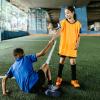
It turns out that the road to success is not paved just by what you do but, more importantly, by how you think.
World-renowned psychologist and “Mindset: The New Psychology of Success” author Carol Dweck, Ph.D., has conducted decades of research to shed light on the power of mindset in fostering accomplishment. There are only two mindsets, which makes the choice simple: a growth mindset and a fixed mindset. Dweck’s research continues to demonstrate that our greatest potential can only be fully actualized by cultivating the former.
Growth mindset vs. fixed mindset
Someone with a growth mindset believes that traits can be developed and improved. Their primary impetus is to improve, and they embrace and welcome challenges. They believe that effort is necessary to develop useful skills and master talents. These individuals persist in the face of obstacles, see failure as an opportunity to learn and enjoy the process because they are not solely focused on the outcome.
Someone with a fixed mindset believes that traits, talents and abilities are innate, static and cannot be improved. Their primary desire is to “appear” smart or talented, and thus they tend to avoid challenges in order to save face and maintain appearances or status. When confronting obstacles, such individuals are likely to give up easily or place blame on other people or factors as a way of preserving self-esteem.
Here are a few simple practices that will reinforce and guide our children (and ourselves!) toward adopting a deeper, truer growth mindset.
1. Use encouragement.
The message we send in response to our children’s efforts is going to have the deepest impact on the likelihood of their success. Contrary to popular belief, encouragement is not the same thing as praise; it is an acknowledgement without judgment.
Praise focuses on what are believed to be natural talents or traits and can take the form of statements like “You did so well, you are so smart,” “You are a natural” or “Wow, your [fill-in-the-blank] skills are amazing!”
Instead, a parent should concentrate on the process or effort: “Wow, it looks like you worked really hard on that project” or “I noticed that you really take on a challenge, even when things are difficult.” Directing your energy and attention on the effort and/or process will help pave your child’s road to success.
2. Respond to setbacks as opportunities for learning and improvement.
Mistakes are simply opportunities for learning. How we respond to our children’s failures, setbacks and challenges will be one of the key factors in influencing their future success.
Responses that encourage learning and improvement might include “It sounds as if you are disappointed with your grade on the math test — what do you think you could have done differently to prepare?” or “I noticed you are really frustrated trying to get all your homework completed on time — are there any strategies that I can help you with that would allow you to get it done in a more timely manner?”
Setbacks provide a perfect opportunity to coach children to come up with their own solutions or to ask them if they would like assistance in coming up with a plan for themselves.
3. Model a growth mindset as a parent.
Even as adults, we are still learning, growing and making mistakes. It is imperative that we model our own process to our children. Talk to them about the challenges you are currently having, or obstacles you experienced when you were their age and some of the things you have done to overcome them. Kids love to hear stories about their parents’ childhoods!
Having a growth mindset comes easily to some because they grew up with parents or mentors who fostered its development. Yet we can all embrace and practice the right mindset, and in the process, motivate ourselves and our children to lead, love and grow.
Editor's note: This article was published a few years ago and has been updated for 2020.











